6 November 2020
Marty Smith is a writer based in Hawkes Bay, whose debut Horse with hat won the Jesse Mackay award for Best First Book of Poetry and was a finalist in the Poetry Award in the 2014 NZ Post Book Awards. She spent lockdown helping her friend, Paul Davis, with his end of life care. Here, she shares her essay I Hope to Make Six Good Friends Before I Die and her poem My Lights, For Paul.
Marty will be reading these works, woven with unpublished poems and the full photo essay, and accompanied by James Geluk, in Lie Down & Listen: Death Salon, a poetic listening party at Verb Festival.
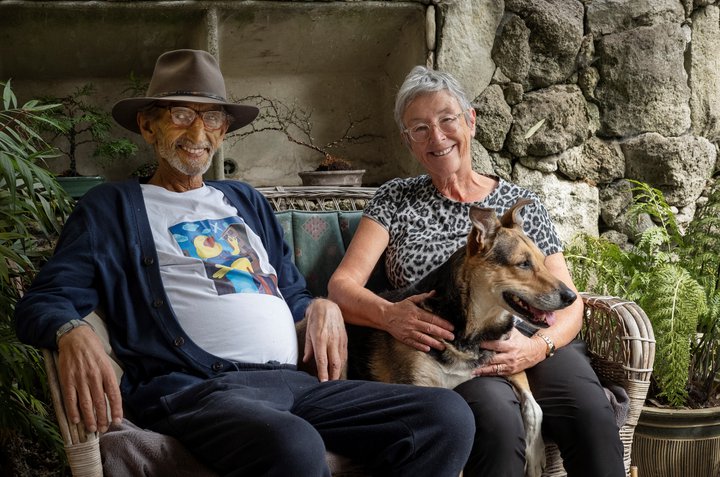
By Marty Smith
For Paul Stanley Davis, 16 November, 1955 - 30 April, 2020
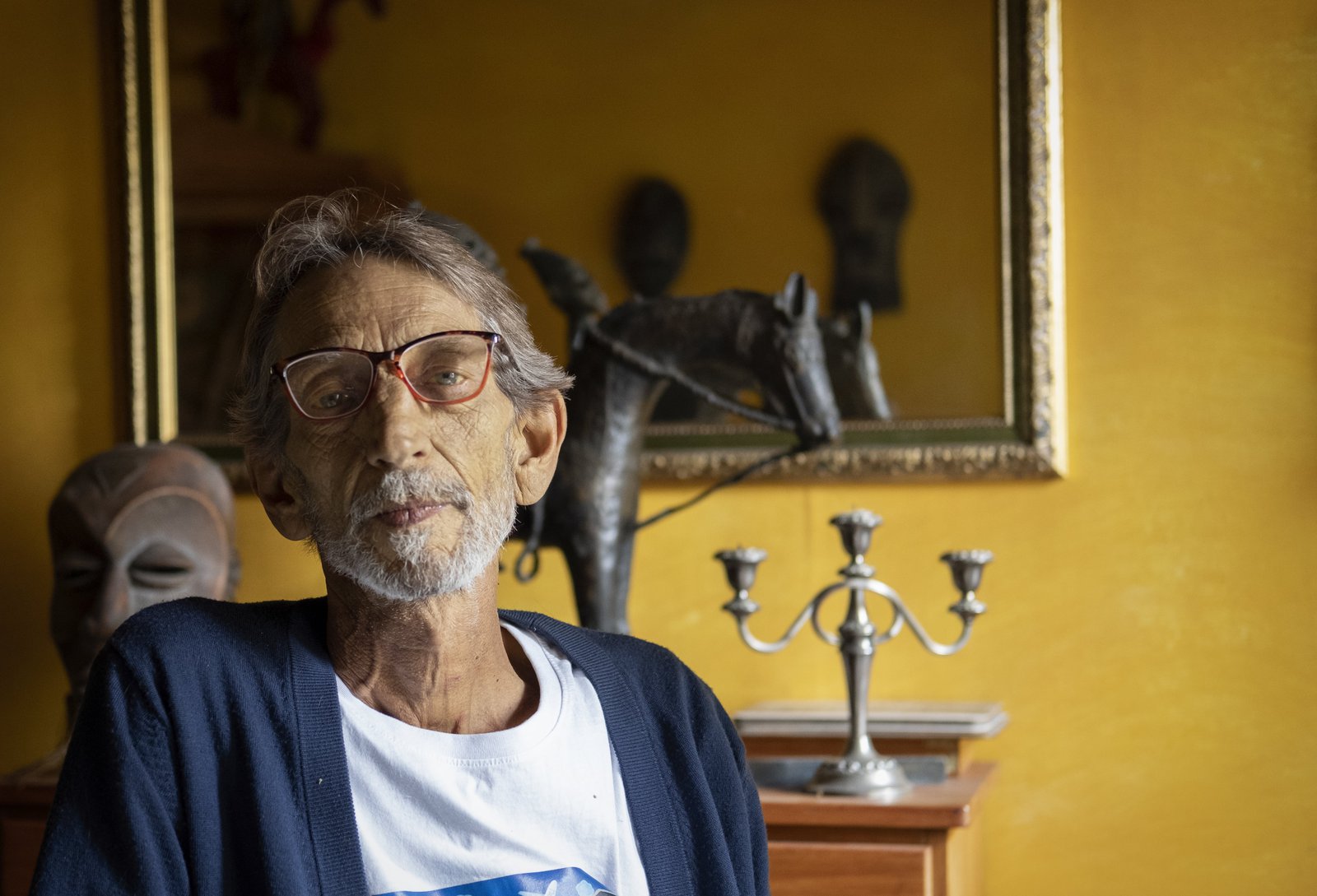
We always know it’s coming, we just somehow forget.
I mean, we know as soon as Paul starts to get tumours cut out. We ask snooker-player-pool-table-maker Andy Heaphy to build us a new table as quick as he can. The felt on ours is faded and thin and the cush is crooked: you can run the ball down to ‘the friendly’ from any angle without even aiming and it’ll roll straight into the hole. We’ve always said, One day... and now we move fast for Paul, who is the best player. Andy jumps us to the top of the queue.
Because the experiments with his heptology team in Auckland are going so well. All the expensive new drugs to try out. All the keyhole surgeries. Paul says he’s fucked anyway, they might as well do what they like.
‘I’m cured of Hep C’, he’d announced at the end of their trial, one Friday night of a few years back, sitting on his stool in the honeysuckle. He let huge smoke trickle out the sides of his grin.
‘Are you going to drink?’ I asked, very interested. I’d never seen him drink in all the years I’d known him. He raised a glass, one small shot of whisky.
Another night, he’d said flatly, ‘They reckon I’ll get liver cancer within 10 years.’
*
Out of sight, out of mind. In two and a bit years on the new table, Paul is strong and cheery. He cracks the ranch-slider twice, trying to get a big side or screw on the white, powering it straight off the table and into the window at force. Two stars, in memorium Paul, to go with the photo on the wall.
*
February/March. We sit with Paul after he comes back from the hospice. He’s confined to his chair in the lounge in the sweltering heat; I think of writing a poem for him. I write it fast while he can still follow; he can’t focus to read. Paula publishes it overnight on Poetry Shelf so I can show the page to Paul while he can see, can know his place in time is noted.
I’m reading to his face, turned to gaze out of window as he listens; when I get to ‘fading into the distance’, him there in his blankets, I lose.
I say, ‘I’m sorry I cried’, he says, stern and reproving, ‘Yes, you did get a bit teary-eyed’.
That’s how come the audio; he’s musical and I want him to hear how it goes. He listens carefully, says, ‘Thank you, Marty,’ quietly and very seriously.
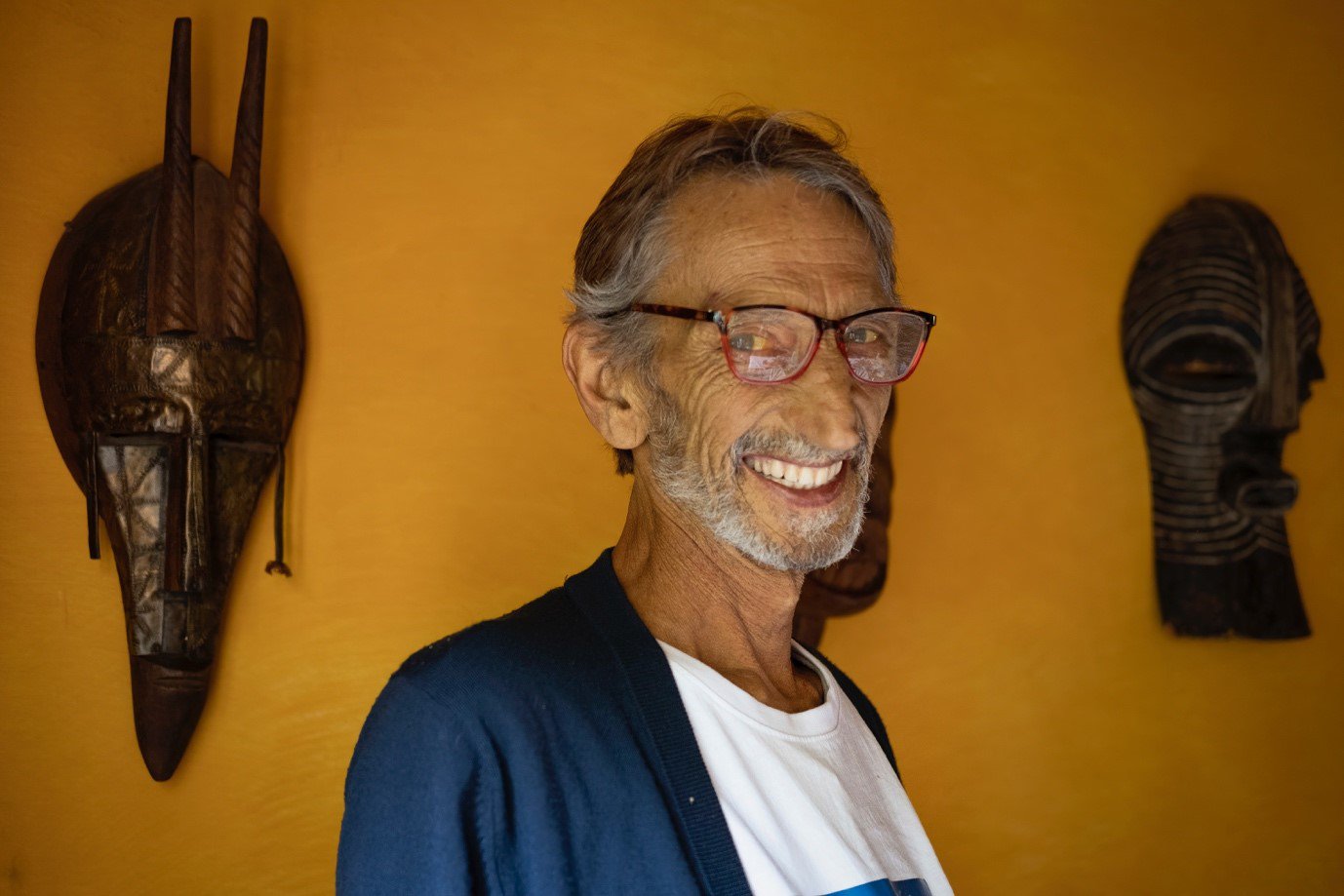
My lights, for Paul
April 8, 2020
All summer long I go on
till every gap is gone,
winding and twisting
wires of lights,
higher and higher
I’m not worrying, I’m looking up
breathless
making more and more:
red bobbles on a plastic buoy
blue glass balls on a round ball valve
a warm white pyramid, tipped with gold
changing colours
on fluorescent globes
I cover it all in lights
right up to the top spike
of the monkey puzzle,
twenty foot high, dazzling out
in black space
beside a five-by-five foot glowing ball
of cats’ eyes, shining greenly
into the velvet dark
and in behind, the port lights
on the estuary
and still my wish is not bright enough
Paul is struggling to stand
the moon, strangely yellow too,
stops to pose above my lights,
pooling moonlight onto the sea
it’s all set up in front of the seat
where Paul can sit
and smoke and see them glow
the tiny red tips on the sea glass globe
are fading now, tail lights going away
Paul says he’s here to play pool,
not look at my lights
he sits smoking and staring at them
shining out of the softest night
he says,
I’d like to see them go in a line down the lawn
and into infinity
I Hope to Make Six Good Friends Before I Die
All summer long, it’s unseasonal and weird. The drought’s locked down hard, and there’s this towering sense of unease.
March 18. In the outside world, our caught-out families are messaging: flights cancelled... transit cancelled...hope to check in soon... Only a handful of flights going from Singapore…
Stefania, in the epicentre in Bergamo, is messaging, Treat it as if it is already there. Stay home…GO HOME AND STAY HOME,
Henry, an ED doctor, is messaging: Hastings and Palmy currently have 6 ICU beds each… it is terrifying… they would only need 9,000 cases total before they will have used up all the ventilators in the country…
—
In Paul’s quiet room, rushing and fear and uncertainty retreat. He’s confined to his Lazy-Boy in the lounge, seemingly unaware of what goes on outside; I’m staring through the window, like I do, at the plants on the dry bank browning off a little bit more each day and dying a little bit more. Every day it doesn’t rain, and the sky burns bluer between the gums. It feels like our whole lives will explode in flames.
Paul’s got other ideas. He scrambles in his blanket, saying, “I’ve got something to show you!” He’s so excited his hand shakes as he passes over the small white card. A logo of a coffin and the words: Hawkes Bay Coffin Club. Under it, written in biro: Paul Davis. No. 406.
I’m shocked, but I smile. “It’s so cool,” he says, all alight, “You can get it in any colour you want, any size.” He takes a drag, puts his head on one side to regard me. “Made to measure,” he says, and grins slyly.
He blows a cloud of smoke, says, “Volunteers help you do as much as as you can manage for yourself. You can decorate it however you like. Cool, eh?” he finishes, triumphantly.
I look at him, considering. “What’s it going to be like?”
“Not telling,” he says.
“And,” raising one finger in warning, “don’t even think of asking. You have to wait for the final reveal.”
He looks straight at me, raises his eyebrows as dramatic pause, says with wicked glee, “When I’m in it.”
I laugh.
At Coffin Club, Shorty’s one of the volunteers helping Paul. He’s fascinated by the banknotes, all colours and sizes. Is it real money? Of course it is, Paul tells him, it’s from his travelling days, he wants to glue it all over the coffin. Shorty offers to write him a cheque for the cash, he might as well burn that, for all the good it’ll do him. Or better still, travellers’ cheques. They both laugh like hyenas.
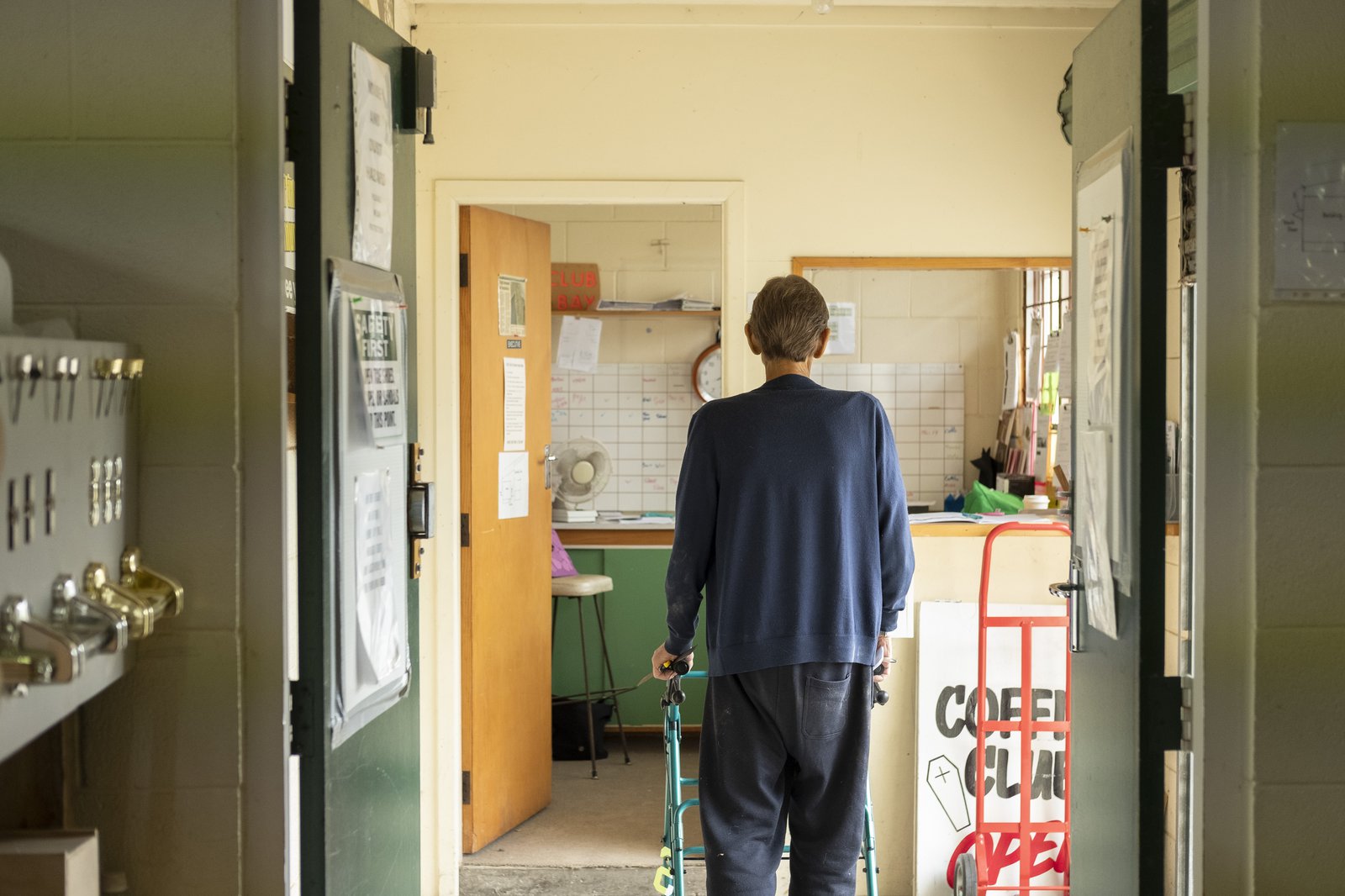
My friend, Flo, is taking a series of photos of people with their dogs. Wouldn’t Paul like a photo of him and Cubic for his son, Jordon?
For someone who thinks he takes ugly photos, Paul’s pretty relaxed, lounging casually on the cane couch. He smiles at Flo, who’s French, as she murmurs, “Could you move a lee-tle to the left? Oh-h-h, the light is be-yoo-t-iful coming through the side.” All his grumpiness gone, it’s him at his best, generous and loving.
Flo says later, it’s what people give her. What he gives her is, you could say, out of this world. He wants his as-yet-unknown-grandchildren to know him.
Flo is taken by Paul’s masks from West Africa, and the statues of dark horsemen, riding. She asks diffidently, “Thees ees just an i-de-a, but what if I made a whole series? Just about you? And your statues?”
Later, Flo says to me, “What a beautiful man.”
—
Paul’s completely chuffed. He looks at me, smiles smugly and says, “No one’s ever told me I’m photogenic before.” Through a cloud of blue, he goes, “I like that one of me smoking, it makes me look like I’ve got whiskers.”
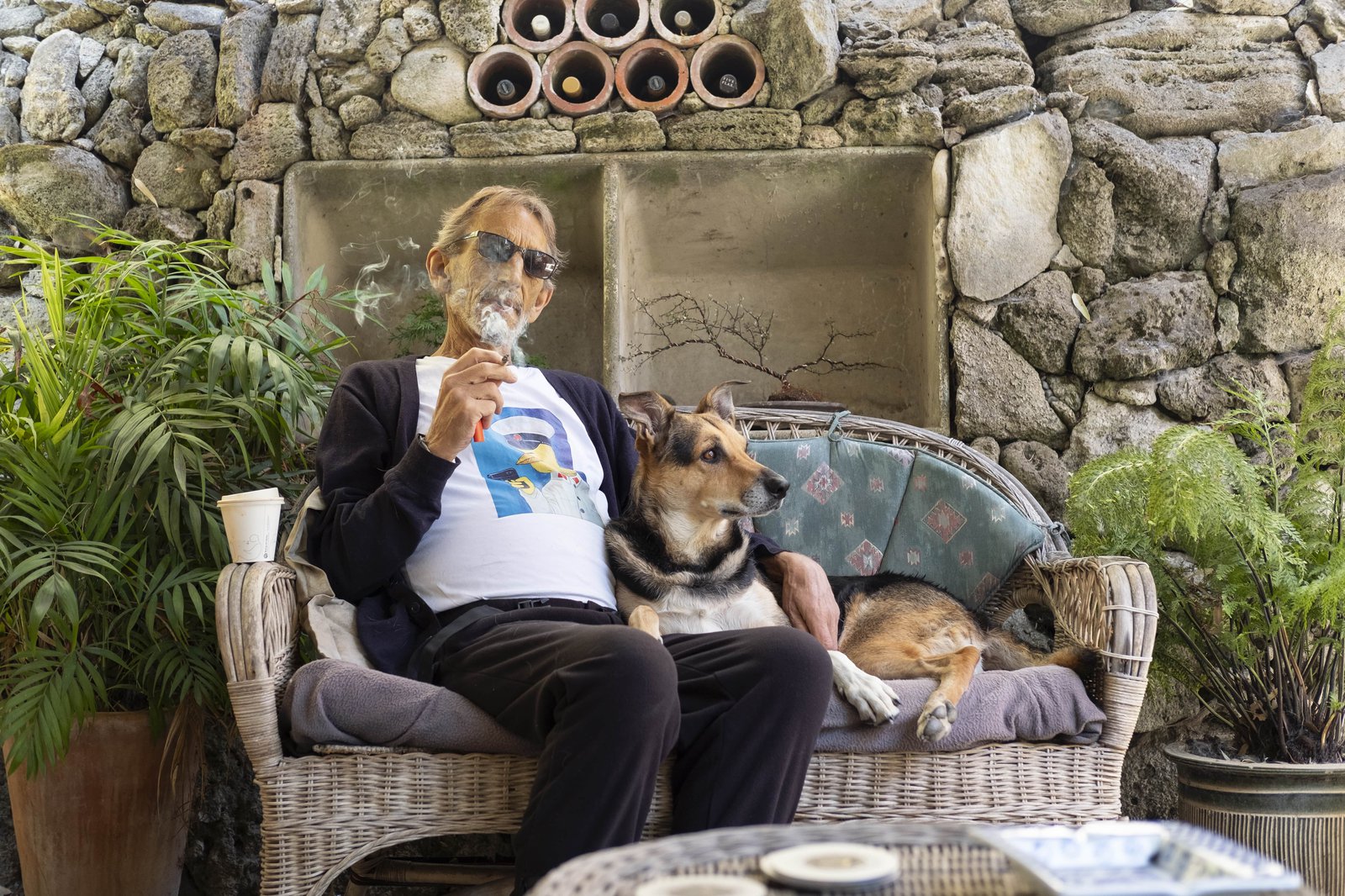
March 20. There’s some dark clouds and a hint of rain when Paul invites us to Park Island for his funeral party. I tell him it always rains for persons of mana, and he says, “Is it?” which is what he says when he’s pleased or intrigued.
He’s huddled on his walker in a heavy coat, hat pulled down. It’s peaceful, the sun still shining full on the graves. Paul stands, takes off his coat, and walks as straight and strong as ever to his place below the roses. “Next to Eric,” he says, then quickly, before anyone can, “Don’t tell me his name. I don’t want to know his last name.”
“What a plot!” Paul says, looking at his grave. “What a view!” turning to wave his arm theatrically at Cape Kidnappers, the chalky cliffs catching a glint of last sun in between the trees. Somewhere a distant dog barks; it’s not Cubic, he sticks right close to Paul.
“I only ask one thing. I don’t ever want plastic flowers. If you see them,” he says flatly, “take them away.” Then he eases himself down, settles his shoulders and hips into the hollows in the hard ground. He crosses his arms across his chest, and closes his eyes. “Make sure they get me level,” he says, conversationally, “I don’t want my head going downhill.”
Paul’s at his own wake: this time, he’ll drink spirits. His liver’s shot, we all have a shot, we yell, To Paul! and knock our whisky back in one hit. Then the wind’s really getting cold, and Paul needs to go home.
We’re still not used to seeing Jordon driving, and Paul in the passenger seat of his 1970s- era Mercedes station wagon, the kind you can’t kill. It’s his signature car in its original blue— he’s never far from his car. Even now, when I see that car, I think, Paul!
—
The next four or five days rush into each other. The endless bastard summer is still hot and still, there’s a breathless unease. We’d shouted, “Fuck off, Covids” for a joke as we watched the Ruby Princess clear Pania and put to sea. And who would want to be on a cruise ship, anyway? Everyone knows what happened next: we’re in a cluster-fuck, as we pool players would say.
—
Paul wants to get dressed, Flo’s coming. Light pours in through the window onto his face as he picks through the piles of money on the table, sorting. “Look at this!” he says, holding up his 100 ruble note. “Look at the watermark! It’s Catherine the Great –cool, eh?” He holds it up to the window, spends a long time looking through the watermark. Something makes him smile fondly, then chuckle. He says, “I’ve had it for years. It’s going to go in pride of place.”
When I bring my laptop over, he gets up. He even gets dressed. He holds it on his knees, advances the photos himself, face creased in pleasure. First he says, “I’m yellow, like the walls,” and laughs. Then he’s absorbed and silent as he scrolls through slowly and carefully. He closes the laptop with a sigh, closes his eyes.
He says Flo’s photos make him see his statues in a whole new way.
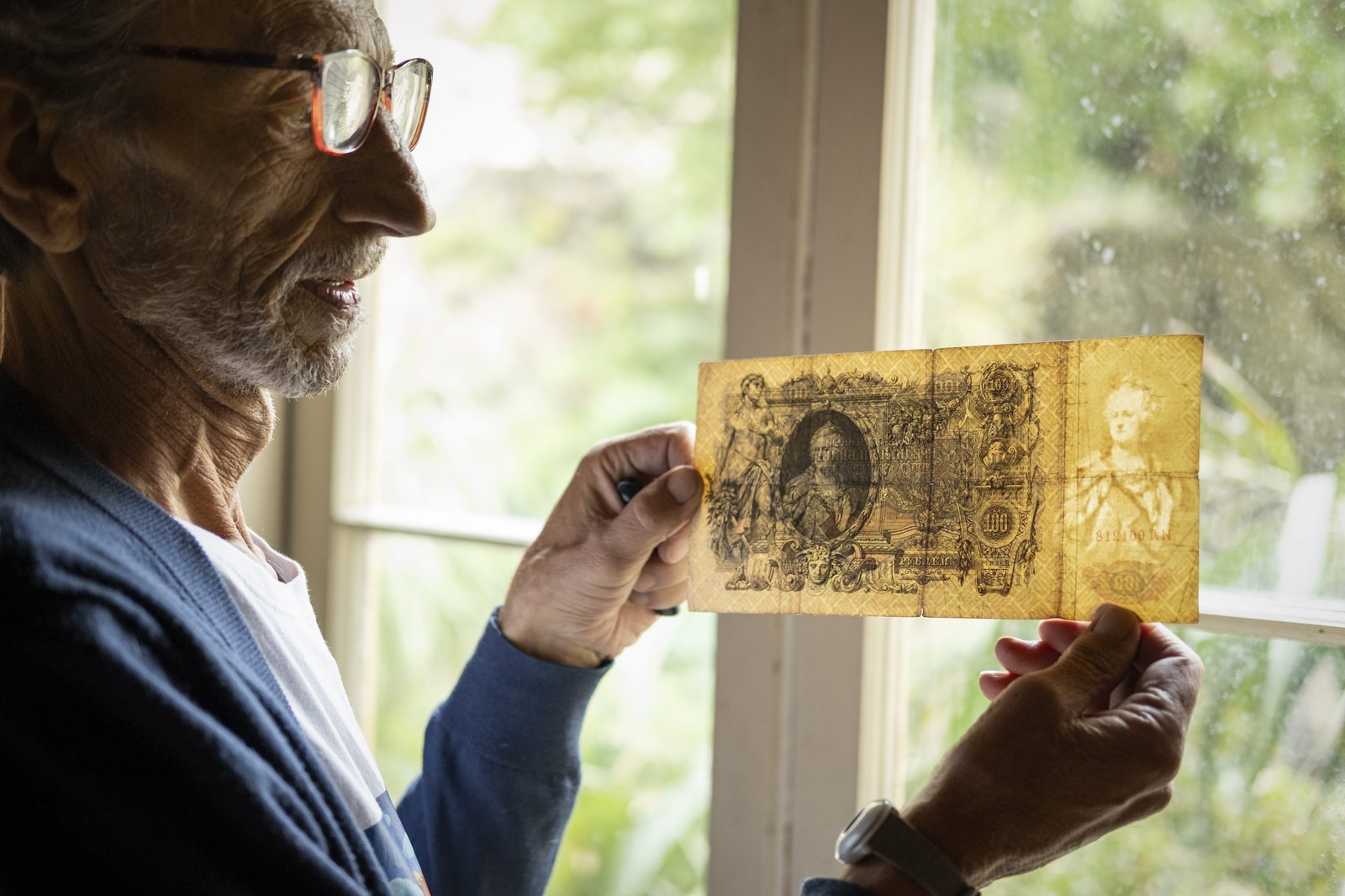
March 24. Paul’s brothers have been staying with him to help, but the clock is ticking down. Steve’s had to leave; Lloyd drives Paul around while he still can.
Very enthused, Paul phones, which he hasn’t done for a while. Flo has to get to Coffin Club right away. He and Flo were to go on Saturday to take photos of people working on their coffins but things move too quickly. Today’s Tuesday; they’re packing everything up fast.
The people who need their coffins during lockdown come to collect them. The others are covered in dust sheets. No one’s doing any work. Lloyd helps him cut his letters out, at least. Michael, the cabinet maker, only has time to fit the handles and screw them in, then the coffin goes home to stand in Paul’s hall.
Later, he says, “Once he came that first time, he seemed to be completely at ease. He had a vision, and he KNEW what he wanted to do.”
Helen, who runs the club says, “He touched us, the whole lot of us. It’s a shame we had him for such a short time. Everyone loved Paul.”
—
Paul has a sudden job he needs to do. I say, “I heard you on the phone. It’s something to do with colours, because you asked if they had it in other colours.”
“Is it?” he says, and smiles secretively.
He tells me what happened, pleased with himself. He wanted stick-on pinstripes; the shop assistant, who was bored, kept bringing the wrong things. In the end, the bloke asked, “What do you want it for, anyway?” and Paul said, ‘For my coffin.” The man couldn’t have been more helpful, brought all sorts of different things. A cool decorative scroll for the ends, wouldn’t take any money for it.
Paul turns his head to me, grins slyly, and says, “Death has its uses.”
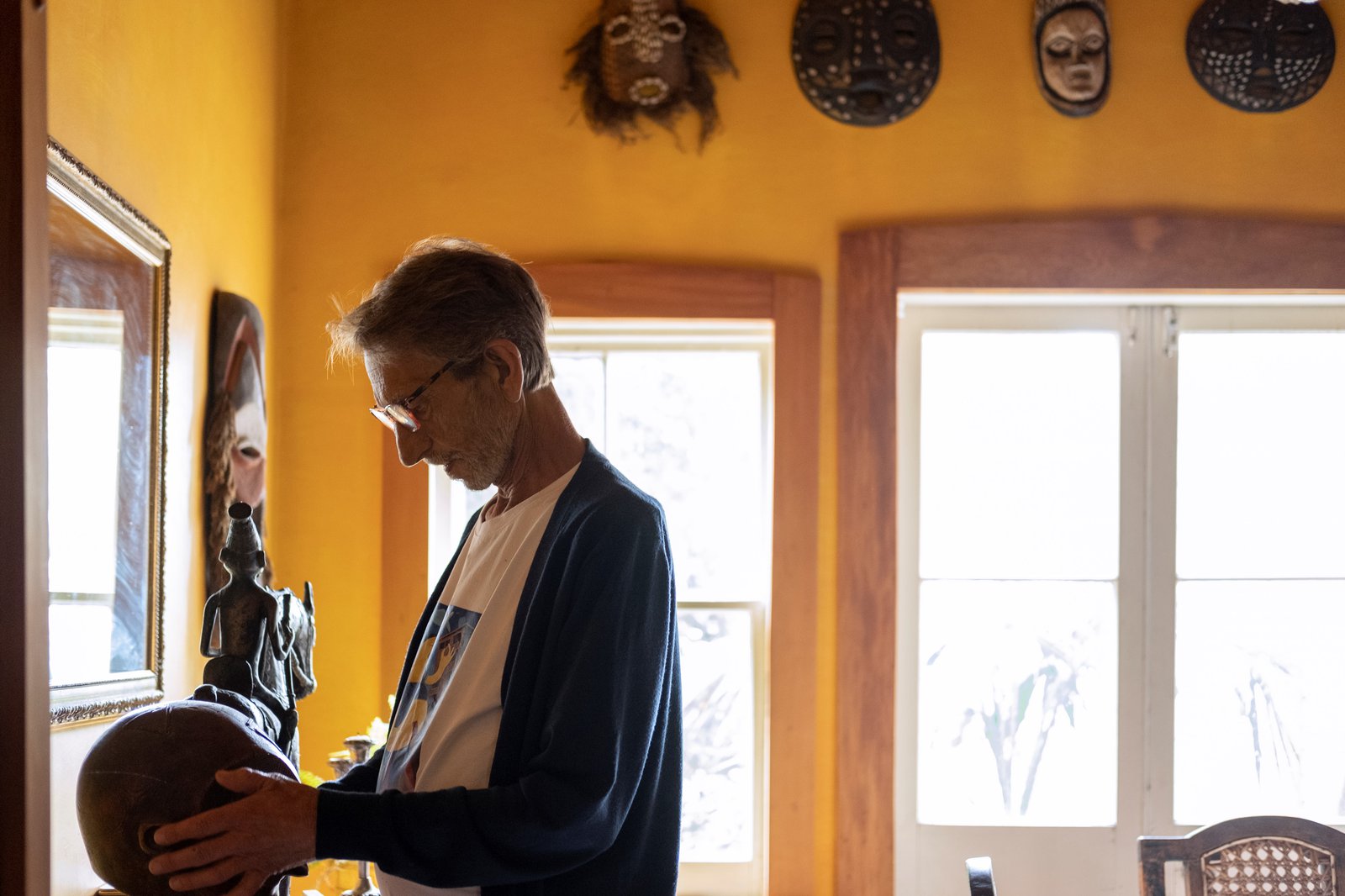
March 26. We worry about who is doing the shopping for Jordon before lockdown.
March 27. Lloyd has to take the last flight to the South Island.
—
Lockdown means no cars on the roads from the north; not a single car going from Bayview along the shingle spit to Napier. No planes on the tarmac, no runway lights. It’s hot and still, and deathly quiet.
—
Lola is Paul’s mum; her carers at the rest home help her to Facetime.
“How are you, Mother?” Paul can only just focus.
“I’m all right,” she says. “Can you come and put things up on the shelf? It’s too high.”
He replies, “Do you like your new room?”
“No,” she says, “I don’t like it at all. They shut the door all the time.”
“That’s because of your bad behaviour,” he says, and they both snigger.
Lola doesn’t understand why she isn’t allowed to leave the rest home to visit Paul. He always cooks Sunday roast for her.
—
March 31. If Paul goes to hospice, he and Jordon will be locked in the room 24/7 till it ends. If Jordon leaves the room even once, he can’t go back.
We’re Paul’s friends, so we’re given lockdown dispensation to help with his care at home.
—
Paul’s slow and tired, and he still has the letters to do. He’s been awake during the night, smoking and talking. He’s waiting for Jordon to wake up. It’s nerve-wracking, but they get the letters on straight.
Smothered hysterical laughter and the word ‘bubble’. Paul tells me to go outside, make sure they’re not buggering up the lacquer. The coffin’s on the barbecue table, they’re pressing the blister down, and I tell Paul, “It looks good. No, the lacquer’s even.”
—
April 6. Paul posts on Facebook, something he very rarely does.
My Dear Friends,
The crab has me now. Full grip, pincers closing.
So thank you for the million laughs.
Thank you for the million kindnesses.
It was a blast, we were blessed.
An American poet, whose name I have forgotten, once wrote:
“I hope to make six good friends before I die, so as not to be carried to my grave by strangers”.
I think I made it.
Love to all,
Wifey.
Much Love !!!!
I read out 38 replies and Paul listens to every one, doesn’t doze. I get up the photos, he gets up his glasses. A small warm lamp burns in us— the days when we were all young and gorgeous—
...Happy times...exciting times...from another life...the life on the road with Paul Davis....
“You can always fix it,” he says, musing, looking at the wheel on its side, punters in the shade of the Unimog, himself squatting in the blinding African sun, spanner in his greasy clever hands. Travellers sprawled under awnings, stubbies dangling from their hands. Always Paul with a fag hanging from his fingers. In Burundi. In London. Driving a double-decker Top Deck bus overland from London to Kathmandu. “They always had Kiwi drivers,” he says, “They can fix anything.” He tells me he knew it was time to stop when he started thinking of people as punters, not friends.
Those were the days, we reckon. No internet, everything Poste Restante. That was real travelling.
—
Paul mostly rests and sleeps; he can deceive us still. When his Top Deck mates call from Australia, he leaps into life, so like himself. Paul’s back, and it’s the best gift. “Bouf!” he shouts, leaning back insouciantly. “How are ya, mate?”
Or Scruffy. Or Whirly. They call nearly every day. New Zealand won’t let them in.
—
There’s still a lot of traffic going through the 50k zone outside Paul’s house: farm vehicles, tractors, cars on their way to the industrial area. The stock trucks rattle by, making Cubic bark and bark. The noise annoys Paul, he uses up energy to shout. He drives Lola’s scooter, goes with Jordon down to the river to give his dog a run. It’s mad, and fantastic, and the goat goes too, crossing the road on a lead. “You drove down the side of the stop-bank? Onto the stones? On Lola’s scooter?” He grins very faintly.
The scooter dies on the stop-bank, when Paul’s already shattered. He’s so exhausted and depleted, he can barely hold up his head. He drags up that grin, says, “Won’t be doing that again.”
—
April 20. Announcement day, and the stakes couldn’t be higher. One more week locked down. Lloyd and Steve stranded at their homes; no one to go to funerals. Paul’s face is stony. He says, “Just chuck me in my car, and straight in the ground.”
It’s time to unbolt the back seats and take them out.
—
April 24. Paul’s bloods show that his liver has failed; his brothers get compassionate leave to travel. It’s a hurry to get there while Paul can still talk. Lloyd drives through the night, it’s very tense. He doesn’t know if the flights will go.
We don’t tell Paul till Lloyd boards for Auckland, when we’re certain. Steve drives him down; they show the letter to the police at the checkpoint in Taupo.
Lloyd leans in close to touch Paul’s face; he opens his eyes, raises his hand to brush Lloyd’s off. Paul gives him the look— Whaddaya? Everyone laughs. Paul is back in the room.
—
Some days Lola knows she won’t be allowed to go to the funeral.
Some days she wonders what to wear to the service.
—
April 30. Cubey’s allowed at last. He spends the whole night on the bed, curled up in Paul’s side, one paw on his leg.
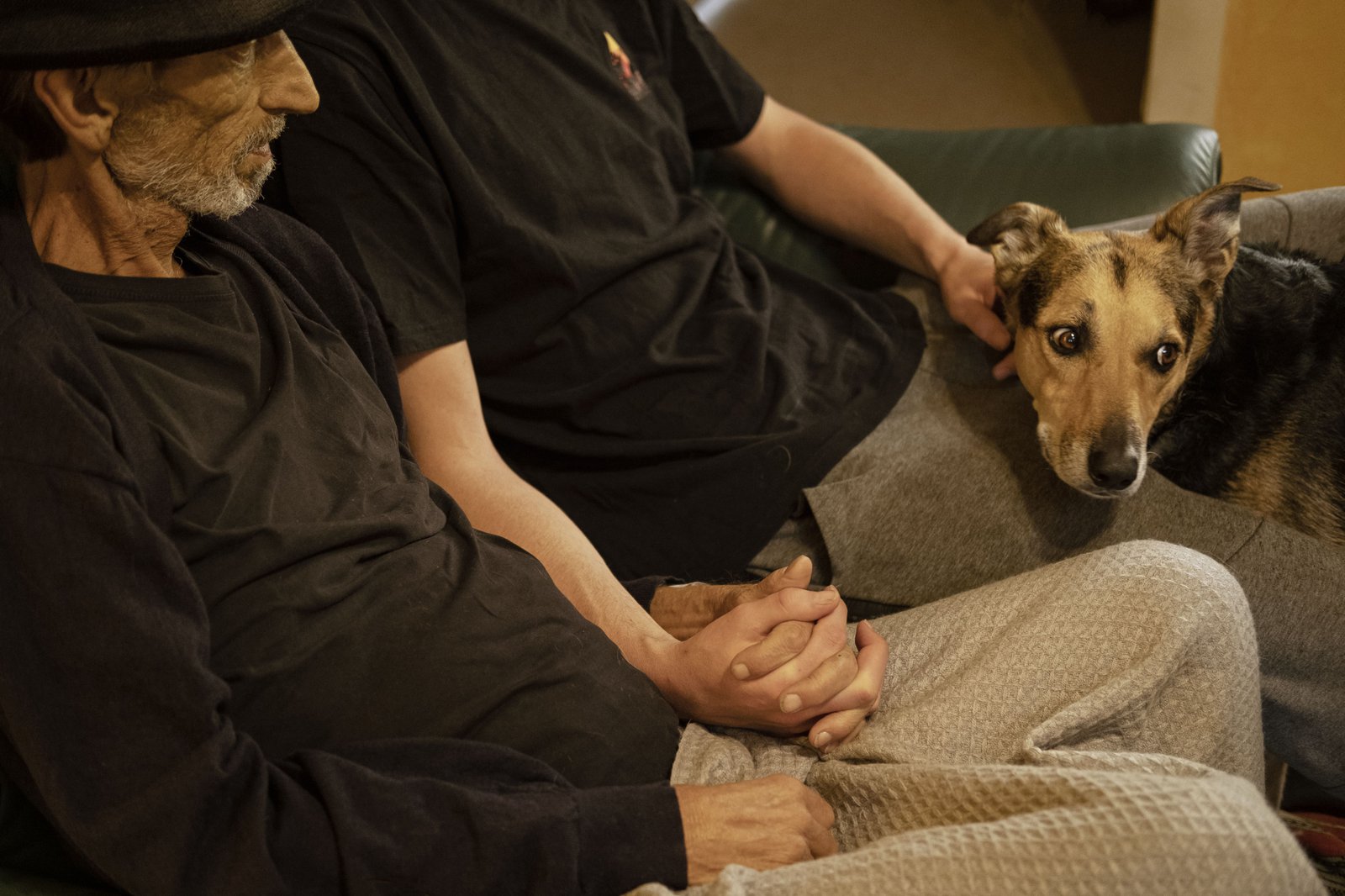
There’s a hot blustery wind and the undertakers are in T-shirts, sweeping up leaves. They’re not expecting visitors; we have special permission. The boys have dressed Paul in his chosen clothes, but they can’t do the eyes; the undertaker fixes them minutes before we arrive.
It’s odd and off-putting, the glow. I laugh out loud, involuntarily touch his hand, say, “Oh, Paul!” In a final coppery flourish, he’s had two mint pennies (New Zealand 1955) placed on his eyes. Paul is paying the ferryman, and two people only see.
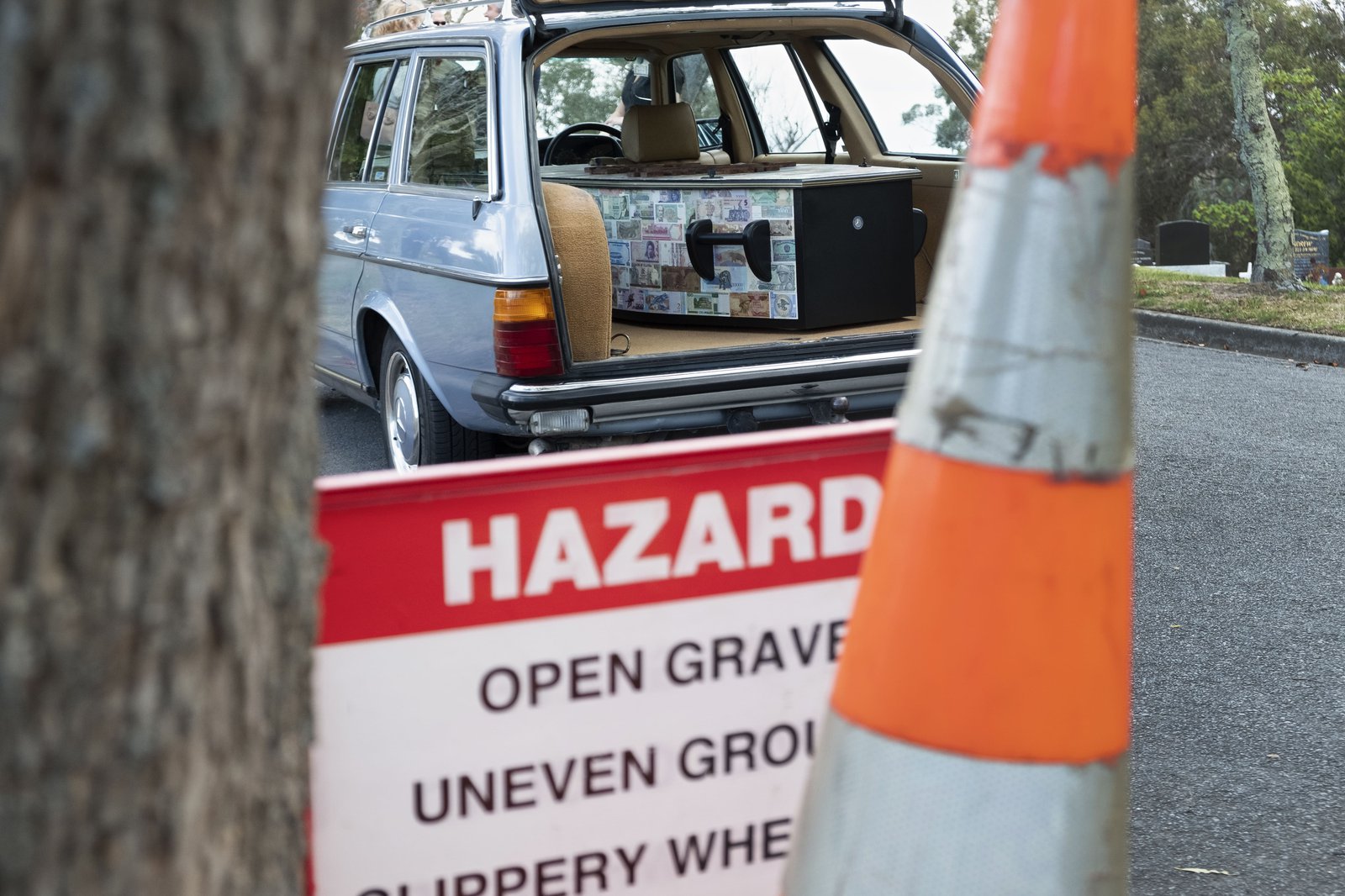
May 5. In the first day of Level 3, the rest home does the only thing they can. Jordon’s allowed to drive Paul to the entrance, park, and get out. He and Lloyd and Steve have to stand two metres away while Lola is escorted out to the car, then she has to return behind security.
Later, she says, with a baffled sadness and anger, “You can’t imagine a mother not being allowed to go to her own son’s funeral.”
Paul’s funeral is live-streamed on Facebook. The camera zooms in on the money plastered all over the coffin, and you can finally see what the letters say: I’M TAKING IT WITH ME.
Steve stands at the head of the grave, giving his brother’s eulogy. The dirt is piled up on one side, the coloured coffin is on the ropes. We’re at the foot, looking at his last words: ADIOS
We throw handfuls of his money after him into the open grave: all currencies and colours, it’s going with him. The notes turn over and over as they flutter down to his coffin, spill over the sides.
Six feet is shockingly deep.
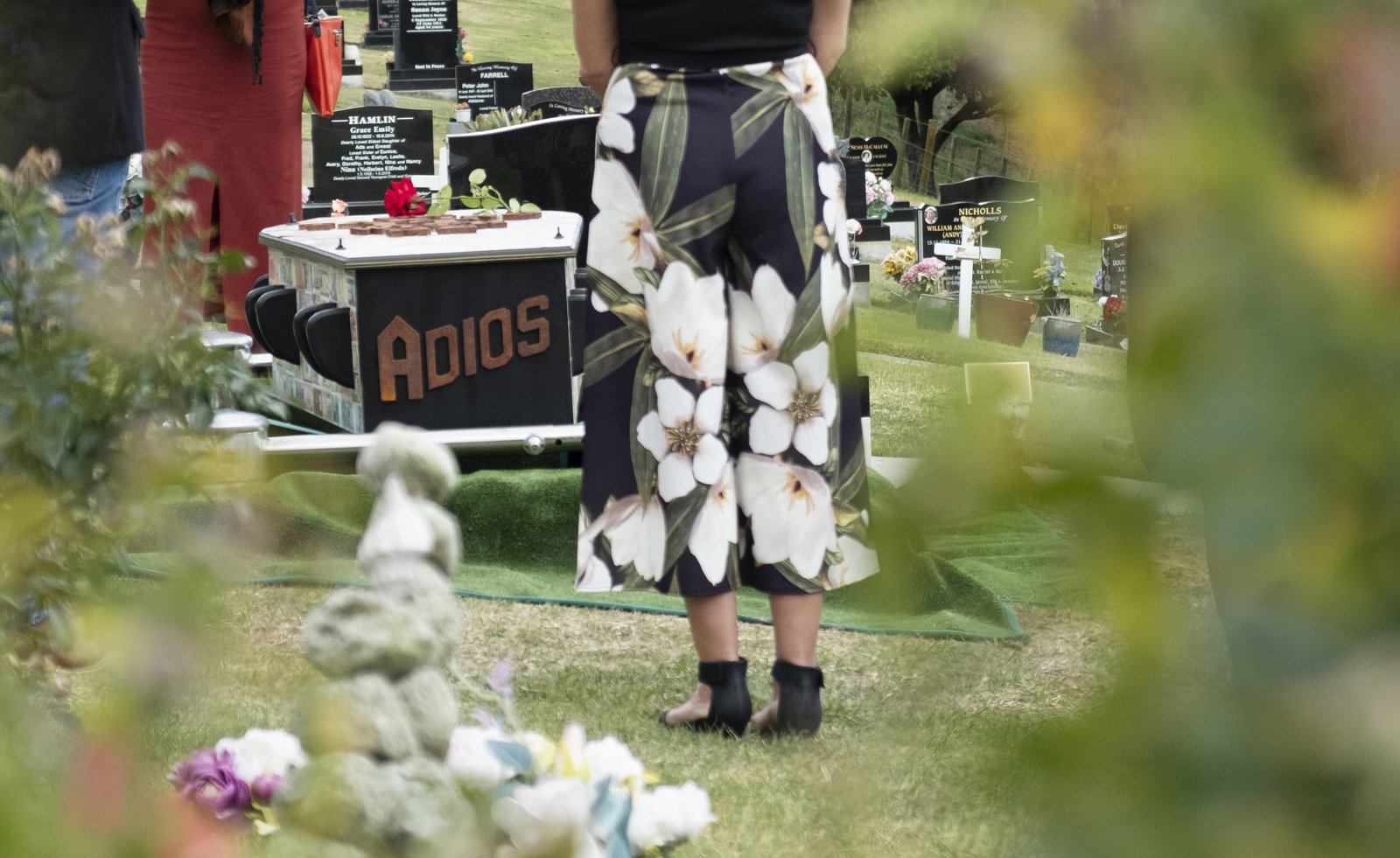
No after-match function’s allowed. It is warm and windy and it still hasn’t rained.
Scruffy in Australia messages: I have been so very sad that a man who touched so many lives could only have 10 people to bid him farewell. He deserved hundreds.
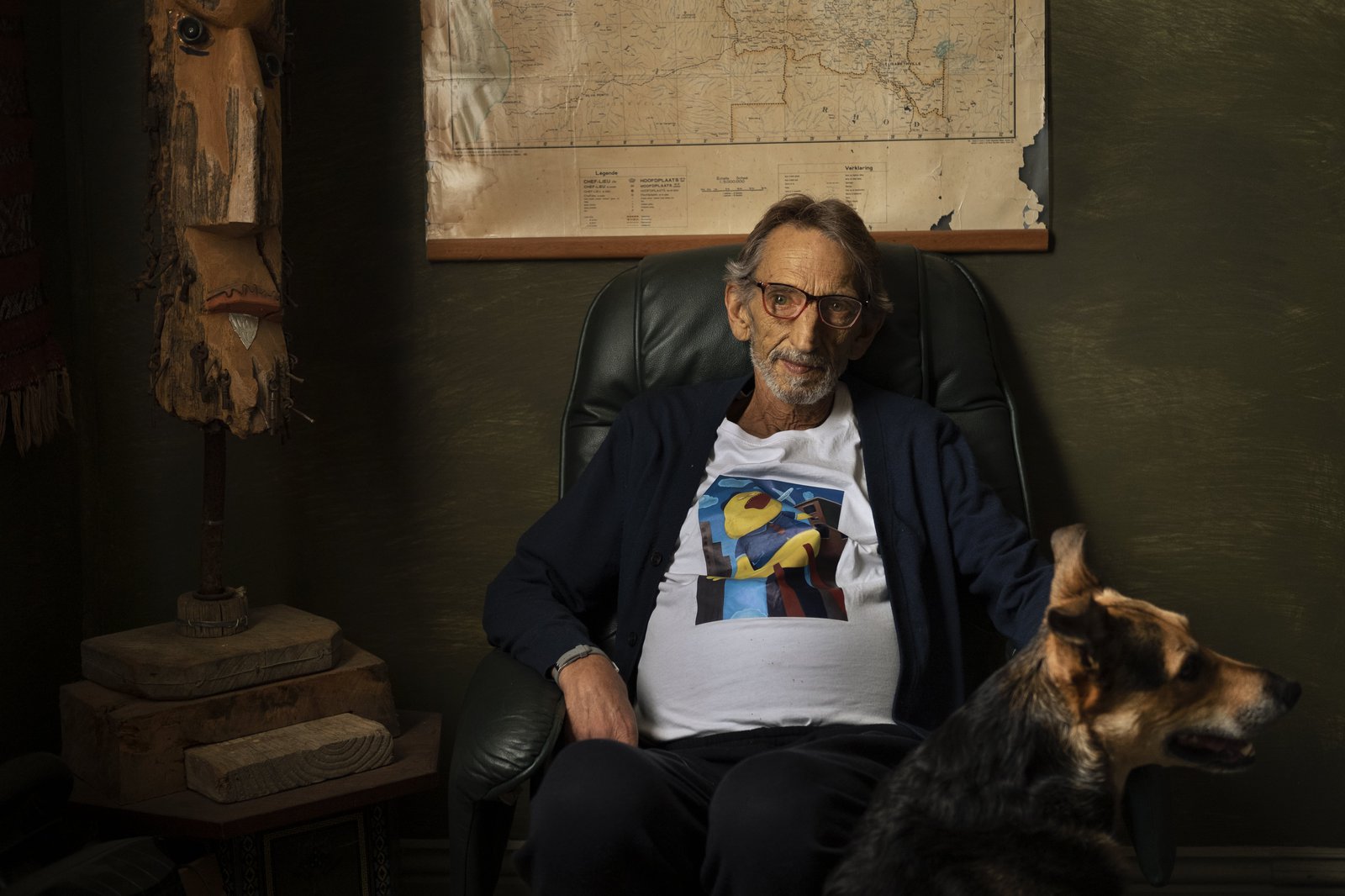
All photography by Florence Charvin.
My Lights, For Paul was first published on NZ Poetry Shelf. I Hope to Make Six Good Friends Before I Die was first published by Verb Wellington. Republished with permission.